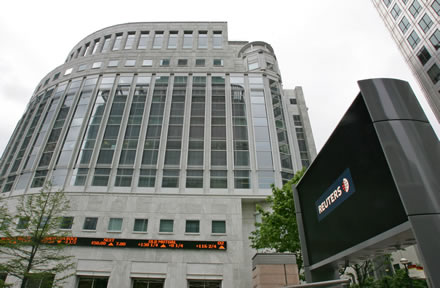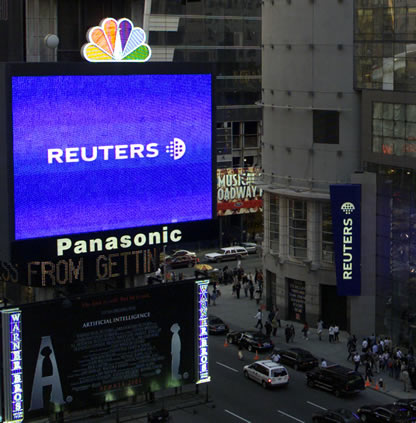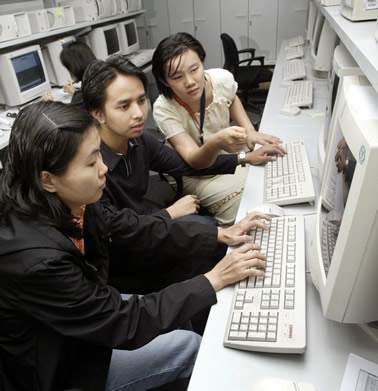« LEVI'S, THE ORIGINAL DENIM BRAND KICKS OFF THE NEXT REVOLUTION IN DIGITAL MUSIC STORAGE | Main | Honda Acura Unveils Trio of Vehicles at the New York International Auto Show »
May 24, 2006
Lack of trust driving consumers to switch news providers
BBC/Reuters/Media Center Poll: Trust in the media.
The Reuters Building, London

A 10-nation poll conducted for Reuters, the BBC and The Media Center across four continents, finds that in a world of committed news junkies, trust in the news provider is a key issue. While some 72 percent of respondents characterized themselves as keen news followers, almost three in ten people have abandoned a media source over the past year due to a lack of trust in its content.

In developing nations the media is trusted more than government, but government wins out over the media in the US, Britain, and Germany. Americans are the most critical of news providers, with 69 percent not believing that news media report all sides.
Reuters at Bangkok

Conducted by polling company GlobeScan as part of Reuters / BBC / Media Center ‘We Media’ Forum, a major 10-nation public opinion poll exploring trust in the media has found that even though the media is more trusted than the national government in half the countries surveyed, significant numbers of people are switching news sources because they do not trust the information they receive.
A total of 10,230 adults were questioned in the UK, USA, Brazil, Egypt, Germany, India, Indonesia, Nigeria, Russia, and South Korea in March and April 2006.
National TV was the most trusted news source overall (trusted by 82%, with 16% not trusting it) - followed by national/regional newspapers (75% vs 19%), local newspapers (69% vs 23%), public radio (67% vs 18%), and international satellite TV (56% vs 19%). Internet blogs were the least trusted source (25% vs 23%) – with one in two unable to say whether they trusted them or not.
TV was also seen as the most 'important' news source (56%) followed by newspapers (21%), Internet (9%), and radio (9%).
Overall trust in the media varies across the 10 countries, with the greatest trust expressed in developing countries such as Nigeria (88% have a lot or some trust), Indonesia (86%), India (82%), and Egypt (74%). These are the countries where trust in national governments tends to be lower in comparison.
Trust in media has increased overall over the last four years — in Britain up from 29 percent to 47 percent and in the US from 52 percent to 59 percent. Germany bucks the trend, with trust in the media down from 49 percent to 43 percent. Trust has also increased over the last four years in Nigeria (from 61% to 88%), India (76% to 82%), and Russia (48% to 58%).
In spite of this, over one in four people (28%) across the 10 countries surveyed either strongly agrees (13%) or somewhat agrees (15%) with the statement, “In the past year I have stopped using a specific media source because it lost my trust.”
This is particularly the case in Brazil (44%), Egypt (40%), South Korea (39%), and the US (32%).
GlobeScan President, Doug Miller, said: "The poll suggests that media is generally trusted across the world - more so than national governments, particularly in the developing world.
“National TV is still the most trusted news source by a wide margin, although the Internet is gaining ground among the young. The jury is still out on ‘blogs’ – just as many people distrust them as trust them.”
Young urban men turning off the TV
Those most likely to have stopped using a news source because of a breach of trust (the 13% strongly agreeing they have done so in the past year) are more likely to be urban males, aged 18-24. Further analysis suggests this young male audience is moving away from television towards the Internet – 10 percent fewer of them, compared to the average, name television as their most important news source (46% as opposed to 56% overall); and 15 percent say the Internet is now their most important news source in an average week, compared to just 9 percent of respondents as a whole. Internet wins out for young people, but blogs are the least trusted of the sources tested.
The younger people are, the less likely they are to get their news from either television or newspapers, and the more likely they are to rely on the Internet. One in five (19%) of those aged 18 to 24 names the Internet as their most important news source, compared to 9 percent overall. Women are more likely than men to name television as their more important source of news while men are more likely than women to name newspapers and the Internet
Internet news sources appear to be winning audiences as a result of distrust in traditional sources – especially attracting young urban men. However, just as many people distrust blogs as trust them.
Perceptions of the media: too much bad news and focus on Western values The findings across the 10 countries paint a varied picture of both threats and opportunities for those involved in the news media:
• Seven in ten (72%) say they follow the news closely every day; even among the 18-24 age group 67 percent say this.
• People are equally split on whether they get the news they want from mainstream media, with 46 percent saying they do not.
• Six in ten (59%) agree that the media covers too many bad news stories, especially Brazilians (80%), South Koreans (69%), Americans (68%), and Britons (63%).
• One in two (52%) agree the media is too focused on Western values and concerns, especially in Brazil (67%), South Korea (66%), and Egypt (61%).
• More people disagree (46%) than agree (42%) that “journalists are able to report the news freely, without interference from owners,” especially in South Korea (63% disagree) and Germany (59%).
• Seventy-seven percent of people agree that they prefer to check several sources of news rather than relying on just one. This is particularly true of Internet users.
Americans don’t agree that the media report all sides of a story Americans stand out from citizens of the other countries surveyed on a number of dimensions. They are the most critical of the news media’s reporting of all sides of a story; 69 percent disagree that the media does this. They are also significantly more inclined to disagree (46%) that the media reports news accurately; and more likely to agree (68%) that the media covers too many ‘bad news’ stories.
UK citizens are strikingly similar to those in the US regarding many of their attitudes to the media. Like those in the US, they are much less likely than citizens in other parts of the world to think that the media reports all sides of a story, with 64 percent disagreeing that the media achieves this. Also 43 percent disagree that the media reports news accurately.
Germans are unique among the populations surveyed in that more name a newspaper (45%) than television (30%) as their most important news source.
In India a solid majority of 64 percent agree that the media strikes the right balance between freedom of speech and respect for other cultures. Nonetheless 58 percent say that there is too much foreign influence in their media and 60 percent that the media is too focused on Western values and concerns.
A substantial 76 percent of Nigerians believe that the news is reported accurately, although there are also three-quarters who believe government interferes too much with the media.







Edited & Posted by the Editor | 6:25 AM | Link to this Post







